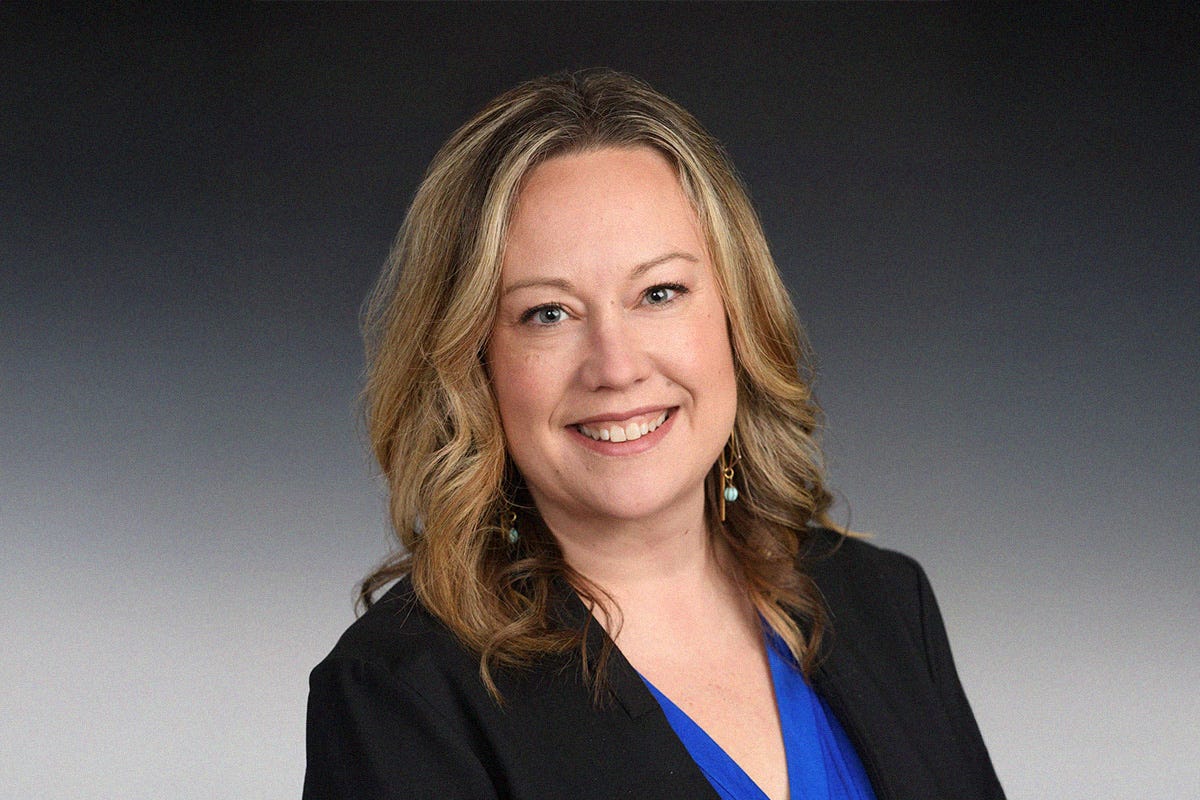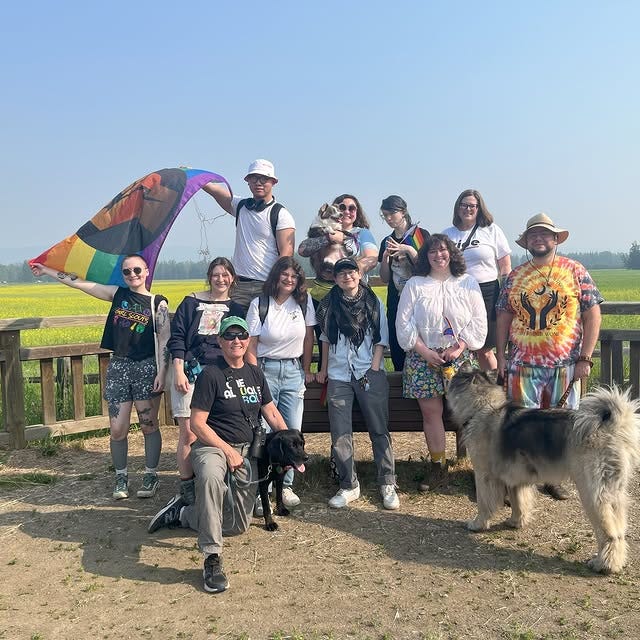This Queer Ally Just Unseated an Anti-LGBTQ+ Mayor in Trump Country
A decisive mayoral victory in Fairbanks signals new hope for Alaska’s LGBTQ+ community and a turning point in the state’s shifting politics.
For Alaska’s LGBTQ+ community, an upset victory in the Fairbanks mayoral election could help heal old wounds.
In the famously frosty city’s October 8 mayoral race, Mindy O’Neall — a longtime queer ally — ousted anti-LGBTQ+ incumbent David Pruhs in a decisive victory, according to preliminary results. O’Neall defeated Pruhs by a 54 percent to 46 percent margin, marking the first time in 10 years that a Democrat has held the office of Fairbanks mayor. Although elections in Alaska’s second-largest metropolitan area are typically nonpartisan, O’Neall notes that it was clear where the candidates stood. Pruhs is staunchly conservative, and O’Neall is a former campaign coordinator for the Alaska Democratic Party, which endorsed her in the race.
“Everybody knows I’m a Democrat,” she tells Queer Agenda. “I’ve run campaigns across the state for the Democrats. I’ve worked for Democrats. I’ve been involved in Democratic leadership. I’m not shy about being a Democrat.”
The win is proving to be part of a larger blue wave for Alaska Democrats in 2025. Progressive candidates took all but one seat in the October elections for Fairbanks City Council and the Borough Assembly — the latter of which included an openly gay candidate, Patrick Roach, winning his race by 13 points. Palmer’s former Democratic mayor, Jim Cooper, retook the position earlier this month with a commanding 20-point win in a crowded five-candidate field.
While Alaska’s leftward trend has drawn much attention outside of the state, which has voted for Donald Trump in three consecutive presidential elections, O’Neall doesn’t feel that partisan politics played a significant role in her win. She believes that her victory illustrates the power of bringing a diversity of voices to the table, particularly groups who feel that city leaders don’t represent them.
“I worked my butt off,” she says. “I had an excellent campaign team. We mobilized volunteers, we mobilized stakeholders, and we mobilized pockets of our community that have not typically mobilized for a local election. I can say it’s my win, but it’s not. It’s our community’s win.”
O’Neall’s election has a special resonance for the LGBTQ+ community in Fairbanks, which is still reeling from the defeat of its 2019 nondiscrimination ordinance, which would have enshrined sexual orientation and gender identity as protected classes. Even after the ordinance passed the city council on a 4-2 vote, the city’s former mayor, Jim Matherly, vetoed it in a surprise move. Despite the fact that he had personally sponsored the measure, Matherly instead urged that the issue should be put up to voters. His proposed ballot initiative, however, never came to fruition.
The shock veto was extremely painful for members of the local LGBTQ+ community. Rinam Kowalski, director of Fairbanks Queer Collective, says that advocates and allies spent months listening to opponents of the ordinance urge that LGBTQ+ people should be eradicated. Then-councilmember Pruhs openly admitted that he didn’t believe the stories of LGBTQ+ people who came forward to share testimony about discrimination they had experienced on the basis of their identities. “In the last 2.5 months, I’ve never heard how bad Fairbanks is… in my life,” said Pruhs, who was ultimately one of the two votes against the measure. “And I think they are full of s**t.”
After the ordinance was unceremoniously killed, Kowalski says that LGBTQ+ locals would call each other just to cry. “It was traumatic to have to go through that and listen to community members who would prefer you to just be dead or not exist,” they tell Queer Agenda. “We were literally begging people to see us as human beings. It’s wild that we had to ask for that, and then having it taken from us, it was gut-wrenching. It was horrible. I think we all still feel it.”
To date, Fairbanks still does not have an LGBTQ+ inclusive civil rights policy on the books, although three other Alaska cities do: Anchorage, Juneau, and Sitka. In 2018, Anchorage became the first city in U.S. history to uphold its nondiscrimination ordinance after far-right groups challenged it at the ballot box. The ordinance survived by 4,100 votes.
As a vocal supporter of that ordinance, O’Neall agrees its defeat left a bad taste in the mouths of many Fairbanks residents. She says community members began to wonder: “Why should I participate in local government? Nobody cares about me.” That refrain was one she heard very frequently during her mayoral run, as she recalls. O’Neall estimates that she knocked on more than 1,200 doors — often visiting the same residence multiple times — to find out what voters wanted from their leadership, and during those visits, people told her they didn’t feel heard by those in power. No politician had ever come to their home before to ask them what they think.
In response, O’Neall’s campaign focused on engaging groups that felt as if they had been shut out of the decision-making process, including Native Alaskans. During her conversations with the public, she says that she very quickly learned that Native populations are a “huge economic driver in our town” but that leaders rarely take time to meet with them. For instance, Pruhs made waves earlier this year after appearing to blame Native people for homelessness in Fairbanks, later offering a quasi-apology. “If you deem that as racist, I do apologize,” he said.
As mayor, O’Neall says that she is excited to finally make city hall “into a vibrant place where people believe that their government reflects back on them.” “I’ve always said this about my public service: I’m accessible,” she says. “You can call me. You can text me. I’ll have coffee with you. I’ll have a beer with you. I’m interested in hearing whatever anybody has to say, as long as it’s respectful and true.”
When it comes to another push to codify LGBTQ+ protections in Fairbanks, O’Neall admits that it needs to be “a long conversation before it gets to the point of being an ordinance.” What that would entail, she says, is talking to local business leaders and community members to demystify equality, so that fear and misinformation don’t flourish: “The thing about Fairbanks is you have to move slow and you have to overcommunicate, so you’re making an earnest attempt to bring everybody along. Where things go wrong is when people feel like things are moving too fast and they don’t understand something.”
While another nondiscrimination ordinance fight could be well away, LGBTQ+ community members are hopeful that change is coming. As O’Neall’s campaign manager, Paul Rasmussen says that one of the first events they attended was a Pride festival in Ester, a tiny town of 2,400 people just on the outskirts of Fairbanks. Seeing O’Neall connect with LGBTQ+ people to envision what the future could look like reminded him of why he moved to Alaska to begin with.
“There’s a tolerance for difference,” he tells Queer Agenda. “The people who live here really love it because it’s not the easiest place in the world to live. You have to deal with weather that’s negative-40 degrees, and you have to plug your car in when it gets too cold. You have snow and ice and darkness. What unifies people is just their love for this place, this place that is worth living in.”






I appreciate the deep dive into Mindy O'Neall's thinking about what it takes to make change in Fairbanks. In talking about resurrecting a nondiscrimination ordinance that the former mayor vetoed, she said that it has to be a long conversation with community members and that you have to "overcommunicate". This is exactly what we have discovered here in Gillette, and what it will take to prevent the repeal of our hate crimes ordinance.